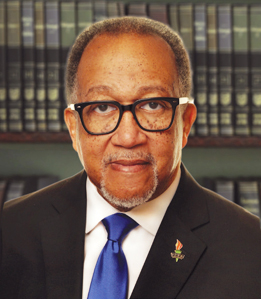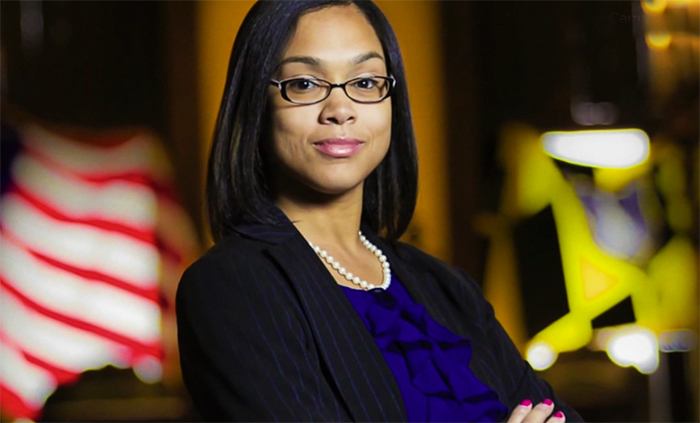
By Dr. Benjamin F. Chavis Jr., President and CEO, National Newspaper Publishers Association
Guest Column
The political weaponization of the justice system has become a dangerous norm. Marilyn Mosby, former Baltimore State’s Attorney, represents a troubling example of how blurred the lines between justice and politics have become. President Biden has a moral and constitutional obligation to address this by granting Mosby a presidential pardon, ensuring that the principles of fairness and equality under the law remain intact.
Mosby, a trailblazing prosecutor, made national headlines in 2015 for her bold decision to charge six officers involved in the death of Freddie Gray, an unarmed Black man whose death in police custody sparked widespread protests. Her pursuit of accountability was lauded by many as a necessary step toward justice in a system riddled with racial bias. Her zealous advocacy brought significant reforms to the criminal justice system, including implementing police body-worn cameras, decriminalizing marijuana, securing exonerations for the wrongfully convicted, and ending prosecutions for low-level offenses. However, her actions as a prosecutor also made her a target of the entrenched stalwarts of the status quo.
Mosby’s indictment on charges of perjury and making false statements related to COVID-19 financial relief programs has raised serious questions. The charges allege that Mosby improperly accessed funds from her own retirement account under the CARES Act and made misleading statements on mortgage applications for two Florida properties. While public officials should be held to high ethical standards, the context and vigor of her prosecution—amidst a sea of similar cases involving far less scrutiny—raises questions about selective prosecution and suggests something far more insidious. These charges seem less about justice and more about punishing a prominent Black woman who dared to challenge systems of power.
The pattern is disturbingly familiar. Across the nation, progressive prosecutors—especially Black women and other people of color advocating for criminal justice reform—face heightened scrutiny from political adversaries and segments of the justice system resistant to change. Cases like those of Marilyn Mosby and Kim Gardner illustrate how dissenting voices can be silenced through legal means, turning the scales of justice into tools of political retribution. This trend, which gained momentum during the Trump administration’s Department of Justice, often involves aggressive investigations and prosecutorial overreach, disproportionately targeting Black officials and reform advocates to maintain the status quo.
The prosecution against State’s Attorney Mosby has been driven by malicious personal, political, and even racial animus on the part of the prosecutors including notably, the former assistant US attorney Leo Wise, who has handled numerous high-profile criminal prosecutions against Black elected officials—including against Mosby, former Mayor Catherine Pugh, US Representatives Charlie Rangel and Maxine Waters.
Unbelievably, Leo Wise personally donated to both of Mosby’s opponents in her successful 2018 re-election campaign and further demonstrated his animus by leaking details of a secret grand jury investigation to the media, seemingly to harass and embarrass her. This controversy must be viewed within the broader historical context of how reformist Black leaders, from the civil rights era to today, face heightened scrutiny and resistance from the ruling class—a pattern that cannot be ignored.
Critics will argue that a pardon is condoning Mosby’s alleged actions. However, pardons have historically been used to address miscarriages of justice and restore balance when prosecutions are tainted by bias or overreach. Just as Biden called out selective prosecution in the case of his son – a case also prosecuted by Leo Wise – Biden can use this pardon to reaffirm the principle that our justice system must be blind to race, gender, and political ideology.
Marilyn Mosby’s story is more than a personal tragedy—it is a microcosm of the broader fight for justice reform and equality in America. By granting her a pardon, President Biden will strike a blow against the politicization of justice and for accountability within the DOJ. As CEO of the National Newspaper Publishers Association, I, and our 230 Black-owned newspapers and media companies, insist that President Biden issue a pardon for Marilyn Mosby, just as he intervened on behalf of his son, Hunter, for the same reasons.
Marilyn Mosby has paid a steep price for her convictions, yet she remains a champion for justice and a hero in our community. Be clear, whether police pull you over tonight in Baltimore or Boulder, your interaction with law enforcement will likely be recorded by an officer’s body-worn camera and that layer of protection is largely thanks to Marilyn’s leadership. It’s time to define The Honorable Marilyn Mosby’s legacy by her contributions to justice reform, not by a politically driven-prosecution.
Dr. Benjamin F. Chavis, Jr., President and CEO of the National Newspaper Publishers Association (NNPA) and Executive Producer of The Chavis Chronicles on PBS TV Network, can be reached at dr.bchavis@nnpa.org

